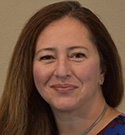
Department of Obstetrics, Gynecology and Reproductive Sciences
Section of Perinatal Genetics
The Section of Perinatal Genetics is a comprehensive service focusing on the evaluation, diagnosis and management of pregnancies with suspected birth defects, chromosome abnormalities, hereditary disorders and metabolic conditions during pregnancy. The Division of Medical Genetics in the Department of Pediatrics provides services to infants, children and adults with genetic concerns.
The division is professionally staffed with a medical geneticist and master's-level trained board-certified/board-eligible genetic counselors. As a part of the division of maternal-fetal medicine, we provide close collaboration with high-risk obstetricians and antepartum testing, ensuring coordinated care. Collaborative efforts between genetics, maternal-fetal medicine, neonatology and pediatric specialists, as well as primary care providers, improve pregnancy management and neonatal outcomes by permitting earlier diagnosis and therapeutic intervention for a variety of fetal birth defects and genetic disorders.
Genetic counseling is available to educate patients about risks to their pregnancy due to age, screening results, family history, ultrasound findings and other concerns. In addition to defining risks, genetic counselors will explain the diagnostic testing and screening options available to ensure the best pregnancy outcome.
A typical genetic counseling appointment lasts approximately 60 minutes. Many patients will bring their partner or another support person to the session. The genetic counselor will draw and analyze the family tree and ask questions regarding the patient’s and partner’s family history. The medical and pregnancy history of each member of the couple will be reviewed, including the outcomes of all previous pregnancies and exposures or medications during the current pregnancy. The genetic counselor will review prenatal test results, including blood work, ultrasound examinations and diagnostic test results, and explain in detail if any concerns were identified. She will analyze this information to help assess your risk of having a child with a birth defect, mental retardation, genetic disease or a chromosome abnormality. All of the available prenatal screening and diagnostic testing options will be reviewed in detail using diagrams and other visual aids. The genetic counselor will also address any questions that you may have and will help coordinate any additional recommended testing with the appropriate laboratories and physicians. A letter will be sent to your referring physician summarizing the genetic counseling session and any recommendations for your care. Most patients who undergo genetic counseling are reassured about their baby’s health and are better enabled to make decisions because of the information provided.
Genetic counseling can be provided in the following languages: English, Spanish, Italian, Hebrew and Russian. For all other languages, interpreter services are available.
Clinical Academic Building (CAB)
125 Paterson Street, Suite 4200
New Brunswick, NJ 08901
Phone: 732-235-8006

Elena Ashkinadze, MS, CGC
Assistant Professor, Clinical Genetics
Supervisor, Genetic Counseling and Reproductive Genetics
Co-Director, Pregnancy Loss Evaluation Service
Current programs
The Clinical Genetics Program is a comprehensive and caring resource for patients of all ages with birth defects, chromosome abnormalities and genetic conditions. Services are coordinated with a complete range of peripheral and pediatric specialists from Rutgers Robert Wood Johnson Medical School.
The program provides appropriate placement for medical care with ongoing long-term follow-up, nutritional evaluation, referral to appropriate community resources, evaluation of other family members at risk and coordination with the primary physician for optimal patient management.
Genetic counseling is available for couples with a family history of a genetic disorder, chromosome abnormality or birth defect, or who have a history of multiple pregnancy loss, stillbirth and/or infertility. Women with these risk factors or advanced maternal age receive evaluation and information to understand and plan appropriately for future pregnancies.
Couples who are biologically related and/or members of ethnic groups who have a high incidence of specific recessive genetic disorders can also be referred to ascertain the risk of that disorder in their future offspring and plan accordingly.
Supervisor
Elena Ashkinadze, MS, CGC
Assistant Professor, Clinical Genetics
Supervisor, Genetic Counseling and Reproductive Genetics
Co-Director, Pregnancy Loss Evaluation Service
Participating Providers (1)
| Elena Ashkinadze, MS, CGC | (732) 235-8006 |

